Sunday, 30 January 2011
Book Review: Richard Wilde by Mary Fitzgerald
This book is based on an old diary found by the author and the story partly fictionalised. This book came highly recommended by readers on a web forum and although it only had a couple of reviews on Amazon's UK site they were both glowing.
Richard Wilde is 95 and told he doesn't have long to live, he decides in what little time he has left he wants to commit his family's story to paper so the secrets he has been hiding for decades will finally come out. The majority of the book is told from Richard's point of view and moves between the present and the past, as he deals with the business of dying while recounting his history. The book covers a period spanning two world wars and massive change. Richard is a no-nonsense farmer's son who joins the Army and sees action in India. As a young man Richard falls for Elizabeth who has come to live on his parents' farm, but he is betrayed when she marries his brother Billy. Their relationship is a major theme, as is the notion of family honour and duty.
The narrative covers major events and the minutiae of daily life equally well, and with this straighforward older man telling the story, while it is beautifully detailed, it never becomes overly sentimental. That said this book has the distinction of being one of very few to make me cry. The biggest secret is one that I had suspected relatively early on but when all was finally revealed at the end the impact was not lessened for that.
This is a wonderful book that particularly appeals to the side of me that enjoys tracing my family tree to discover more about social history. As well as being a fantastic although tragic story it is also a brilliant slice of history and a book I would have no hesitation recommending.
Friday, 28 January 2011
Book Blogger Hop 28/1 - 31/1

It's that time of the week again, off on the blog hop, hosted by Jen at crazy-for-books.com. I love this chance to find other great book blogs, meet people and share opinions.
This week's question is:
"What book are you most looking forward to seeing published in 2011? Why are you anticipating that book?"
Since getting my kindle I haven't followed my old faves quite so slavishly so I don't really have a list of highly anticipated books. However I recently read No Good Deed by Mary McDonald, the sequel is due shortly and I'll be keen to read that when it comes out.
Labels:
Book blogger hop
So e-books won't take off hey...
While there seem to be plenty of people out there who don't believe in the e-book I really wasn't surprised when I turned on the news this morning and one of the lead stories was Amazon's announcement that in the USA in the last quarter of 2010 sales of kindle books outsold paperbacks. What did surprise me slightly was that the figures don't even take into account free books. A related story that also appeared today is that for the first time the judges of the Man Booker prize have been sent e-readers to read longlisted books on.
So to the cynical price fixers at Hachette, HarperCollins, Macmillan, Penguin, and Simon & Schuster publishers, all of whom have adopted the "agency model" and invariably price kindle editions at a higher price than the paperback version, you may not like e-books but it's about time you embraced change, realised they are here to stay and stop ripping consumers off with a business model of such dubious legality!
So to the cynical price fixers at Hachette, HarperCollins, Macmillan, Penguin, and Simon & Schuster publishers, all of whom have adopted the "agency model" and invariably price kindle editions at a higher price than the paperback version, you may not like e-books but it's about time you embraced change, realised they are here to stay and stop ripping consumers off with a business model of such dubious legality!
Thursday, 27 January 2011
Book review: The New World by Patrick Ness
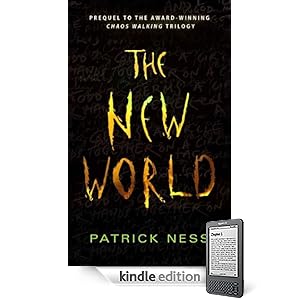 First off, this is actually a short story which took me no time at all to devour. It came to my attention when it appeared on Amazon as a freebie (and in fact as I write is still free) The product description made it clear it's the prequel to a series but didn't hint that it's a sci-fi or a YA series.
First off, this is actually a short story which took me no time at all to devour. It came to my attention when it appeared on Amazon as a freebie (and in fact as I write is still free) The product description made it clear it's the prequel to a series but didn't hint that it's a sci-fi or a YA series. I haven't really bought short stories and novellas in the past, maybe because in traditional tree book format I never really noticed them, but I'm trying to be more open and this is the second I've read this month. This story details Viola's trip to the New World, where she and her parents are meant to establish a new colony for themselves and other colonists who will join them later, who have only ever known life aboard spaceships. There are also flashbacks to the run up to their departure.
Being so short there isn't much time for a lot of character development but Viola is clearly a young teen who is more than a little scared at being one of the first to arrive on a planet, and who is fed up of everyone talking about hope. I expect for fans of the series who have already read the books they would be a lot more able to empathise with what she goes through.
I found that the story immediately grabbed me and I wanted to read on to find out what was going on and put the action into context. I am so glad I didn't know it was sci-fi YA material as I might have otherwise ignored it, but having made light work of it I was impressed by the quality of the writing and how it pulled me in. I may not get round to reading them any time soon but I'll certainly be looking for the series now.
Labels:
book review,
Patrick Ness,
sci-fi,
short stories,
The New World,
YA
Book Review: Blank Slate (A Kyle Jackle thriller) by Zack Hamric
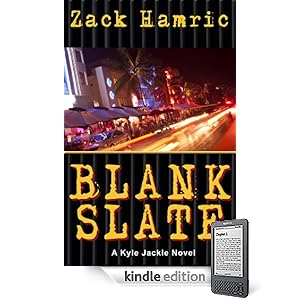 This another book I bought as a cheapie to try a new author, the product description appealing to the side of me that likes a thriller, especially with an international dimension thrown in.
This another book I bought as a cheapie to try a new author, the product description appealing to the side of me that likes a thriller, especially with an international dimension thrown in.The book starts with Kyle Jackle coming round from a serious beating with a nasty case of amnesia. The scene then switches to a woman running for her life in Naples, before moving back to Florida. Kyle has to discover who he is & why he appears to have links to the Russian mob. The story is largely told from his viewpoint, with parts of the story picked up by other characters such as Miami Dade homicide detective Manny Rivera. The action moves from south Florida through to south America, as Kyle picks up the threads of his life and decides he needs to go forward to rediscover his past. The chase is then on as he sails towards a confrontation with the mob.
The book covers the links between the mafia and the Russian mob, drug smuggling and people trafficking and sailing, which I am guessing is a particular passion of the author's from the loving detail it is mentioned in. It paints a vivid picture of the seedier side of life and is action-packed from the start. I warmed to Kyle's character but was less impressed with the female characters, all strippers or woman with impressive physical assets but little substance. Tasha was the main female character and she was meant to be something of a mystery but even with the reveal on her close to the end of the book I still didn't find her credible.
My other complaint about the book was the number and variety of typos. It didn't start too badly but later in the book, unless I seriously lost attention and there was another character with a similar name, one character's name changed for a few pages before changing back again, and rogue apostrophes crept in. Usually although I notice typos a mile off I don't find them offputting, but when el Jefe became Jeff I couldn't take him too seriously anymore.
Overall I would consider reading more books by this author if reasonably priced as the general plot was good but the issues mentioned above somewhat detracted from my enjoyment.
ADDED: One of the things I love about finding new authors via the kindle is how interactive the experience becomes. In praise of Zack he has responded to my review, something I'd never have expected in the past from traditionally published authors. The other beauty of e-books is how easy it is to update them. He says he will be doing an update soon and I have passed on details of the typos I spotted where I could find them again, so hopefully soon the paragraph above on typos will be null and void. I have read a couple of other kindle books that have been updated and if you contact Amazon they will resend the new version free of charge!
Labels:
Blank Slate,
book review,
thriller,
Zack Hamric
Tuesday, 25 January 2011
Looking for inspiration
The Man Booker prize is one of those prizes I've always been aware of but never paid a great deal of attention to in the past. I think to me it's one of those prizes that makes headlines very briefly, the decision is usually derided by some quarters and then it disappears from my conciousness again. I have been thinking about it this week having just read The Life of Pi, which won the prize in 2002.
Since I got my kindle I've been in a complete download frenzy, trying all sorts of books and authors I wouldn't have paid attention to before, partly based on price and partly on reviews. Now I'm running out of steam a bit, and the Amazon top 100 seems to be heavily populated by romance novels which aren't my cup of tea. As such I was thinking maybe I ought to take a look at other Booker prizewinners and expand my horizons in a different way. So, I took a look at the Booker Prize website and was a bit shocked at how few I'd read. I thought I was relatively well read but must have been deluding myself! In a way I'm pleased though as it gives me a bit of a theme, and I can now go and hunt out some winners I like the look of and intersperse them with the others I already have in my to be read stack. Anyone have any suggestions of winners they've enojyed?
Since I got my kindle I've been in a complete download frenzy, trying all sorts of books and authors I wouldn't have paid attention to before, partly based on price and partly on reviews. Now I'm running out of steam a bit, and the Amazon top 100 seems to be heavily populated by romance novels which aren't my cup of tea. As such I was thinking maybe I ought to take a look at other Booker prizewinners and expand my horizons in a different way. So, I took a look at the Booker Prize website and was a bit shocked at how few I'd read. I thought I was relatively well read but must have been deluding myself! In a way I'm pleased though as it gives me a bit of a theme, and I can now go and hunt out some winners I like the look of and intersperse them with the others I already have in my to be read stack. Anyone have any suggestions of winners they've enojyed?
Labels:
Man Booker prize
Sunday, 23 January 2011
Book Review: Life of Pi by Yann Martel
Life of Pi is one of those much vaunted books that I hear a massive amount about, then approach with trepidation wondering how much of the hype is merited. Checking the background to the book before writing this I was surprised to see it was 2002 when it won the Booker prize - I didn't realise it had taken me so long to get round to it!
The book starts with an author's note explaining that it seemed natural to write the book in the first person, presumably to better convey the experiences of Piscine Patel (better known as Pi, or 3.14, at school, rather than endure the mispronunciation of his full name) It also makes the lofty promise that the story will make you believe in God.
The first part introduces us to Pi's early life in Pondicherry, India. He is growing up living in a zoo, attending a Catholic school and trying to be a Muslim, Hindu and a Christian. This is to the bemusement, or perhaps amusement, of the rest of his family. Concerned by the political climate of the mid 70s Pi's parents decide to sell up and move to Canada. Many of the animals are sold to zoos in the USA, so arrangements are made for the family to travel with the animals by sea, leading us to the second part of the book.
At the start of part 2 the ship the family and menagerie are travelling on sinks. Somehow Pi finds himself alone in a lifeboat, save for the company of a zebra, a hyena, an orang-utan and a Bengal tiger. Not only does Pi have to survive 227 days afloat in the Pacific, with all the attendant problems being cast adrift presents, he also has to deal with his animal companions.
The final part takes place in a hospital in Mexico once Pi has finally found land once more. He is interviewed by investigators from the Japanese Ministry of Transport, who are investigating the disappearance of the ship Pi was travelling on.
The first part tells us about the sort of person Pi is, provides an interesting defence of zoos and covers quite some ground on religion. In fact I felt a little bogged down by the pages and pages on the basic beliefs that support the three religions Pi subscribes to. At this point I was starting to think it would be another of those books that failed to meet high expectations. While there are moments in the second part where Pi is hoping for divine intervention or marvelling at creation religion as a theme plays much less of a role than I was expecting.
Moving onto the story of his time at sea the book shifted gear. Details of the battles between the animals and how Pi manages to provide himself with the essentials of life while avoiding instant death by tiger was highly readable, although by now I was starting to question whether what had been set up as a true story was anything of the sort. This is something of a flight of fancy that I enjoyed despite some parts including butchery in the name of survival that made me cringe.
The final part sealed my affection for this book. In most books I read by the end I want to be clear about what has happened and generally quite like it if all the threads tie up. However here the end of the book throws everything I read in even greater doubt. For once instead of feeling miffed I find myself happy that I am mystified as to what actually happened. This is a rare occasion where I am pleased to say a much hyped book lived up to it's reputation, in my eyes at least, although I don't think it alone would make me believe in God.
Friday, 21 January 2011
Book review: No Easy Road by Patsy Whyte
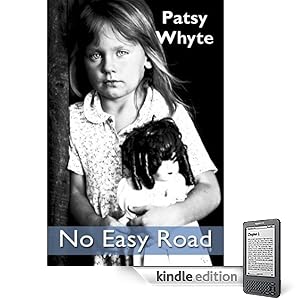 I found this book being recommended on a forum and when I read the product description thought it sounded fascinating and moving. This book is the author's debut autobiography (apparently a second book continuing her story is planned) and tells of how she was taken from her traveller family at a young age, and details her experiences in childrens' homes and hostels. Not only does she have to contend with the cruel, detached house mother but also the negative attention her family's reputation brings. She gets herself removed from care at 15 and struggles to live without a family or the state supporting her. At the end she has reached 16 and we find out a litte about what happens to her later in life in the epilogue.
I found this book being recommended on a forum and when I read the product description thought it sounded fascinating and moving. This book is the author's debut autobiography (apparently a second book continuing her story is planned) and tells of how she was taken from her traveller family at a young age, and details her experiences in childrens' homes and hostels. Not only does she have to contend with the cruel, detached house mother but also the negative attention her family's reputation brings. She gets herself removed from care at 15 and struggles to live without a family or the state supporting her. At the end she has reached 16 and we find out a litte about what happens to her later in life in the epilogue.Firstly I ought to say I have tremendous respect for the author, it must have taken a lot of courage to dredge up most of these memories and then share them with the public. I found the early part of the book very moving and cannot imagine how life must have been for young children growing up without love and affection in an institution. I think having a young daughter myself made it really hit home. I was also interested in reading about Patsy's visions of spirits, but felt that after the theme was introduced it was never really developed.
Unfortunately I went into this book expecting something it wasn't largely because of the product description, "She rubbed shoulders with the rich and powerful and the poorest in the land, and drifted into a world of violence, prostitution and drugs which almost claimed her life." All these elements played a part in her life but this statement lead me to expect something different, it almost makes it sound like she fell into the underworld when in fact she was a young woman who struggled to keep a job and a roof above her head and was subjected to domestic violence. It doesn't make the story bad, just not what I thought it would be.
Overall it was an eye-opening account of a woman who was failed by the system, but I found the writing style a bit too much "tell" and while I don't doubt some of the incidents must have been very painful to recount, to me the way some incidents were written meant they weren't entirely clear, leaving me a little confused as to what had actually happened. On the kindle every page had big spaces between paragraphs, and the paragraphs themselves were short and staccato leaving a lot of (off) white space. The snappy telling worked at the beginning, because it seemed to fit with how a young child might feel in such distressing circumstances but didn't sit comfortably with me later on. I had expected it to make me quite emotional but it was all quite matter of fact and didn't have quite the impact I thought it might. I'm afraid this isn't a book I would readily recommend (and as this is an autobiography I feel terrible saying that)
Follow Friday with Parajunkee
This week's question is:
Who do you cheer for?
I grew up just north of London in a city where everyone supported either Arsenal or Spurs. I was pretty undecided until my 21st birthday when my olds thought for some crazy reason shares in Spurs would be a good present. So, I have a vested interest in them doing well and was delighted when we got Harry Redknapp as gaffer.
Labels:
Follow Friday
Thursday, 20 January 2011
Book review: Darkness Under the Sun by Dean Koontz
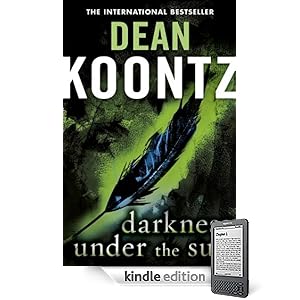 I haven't read any of Koontz's work for a very long time, so when I noticed this short story available as an e-book exclusive it seemed like a good way to reacquaint myself. Apparently this novella recounts a pivotal moment in the life of a character in recent release What the Night Knows, an interesting tie up.
I haven't read any of Koontz's work for a very long time, so when I noticed this short story available as an e-book exclusive it seemed like a good way to reacquaint myself. Apparently this novella recounts a pivotal moment in the life of a character in recent release What the Night Knows, an interesting tie up. The story starts with 11 year old Howie hiding on a rooftop, watching people going about their daily business. He clearly feels he doesn't belong and immediately with hints about his physical appearance being the cause my interest was aroused. On the rooftop he is surprised to find another loner who he immediately wants to befriend. This encounter is to have repercussions that haunt Howie for decades.
This wasn't quite Koontz as I remembered his work, but I haven't read a short story by him before and it could be my poor memory. The start was intriguing, then it became a little predictable, and the end potentially took the story into the realms of the supernatural. Towards the end I felt it was all a bit rushed, compared with the level of detail earlier on. It certainly kept my attention and I completed it during a short train trip, and while I won't be raving about this book I will probably read What the Night Knows in the future (ideally once the publishers have stopped price fixing) so I suppose from the author and publishers' point of view it's job done.
Wednesday, 19 January 2011
Book Review: Remix by Lexi Revellian
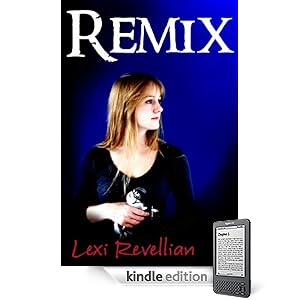 This is a book I had seen while browsing the kindle store and had bypassed as the synopsis didn't really grab me. However I started seeing some great comments in the Amazon forums so I thought I'd give it a try. And I'm so glad I did. This is a wonderful book!
This is a book I had seen while browsing the kindle store and had bypassed as the synopsis didn't really grab me. However I started seeing some great comments in the Amazon forums so I thought I'd give it a try. And I'm so glad I did. This is a wonderful book!Caz runs a business making and restoring rocking horses and lives above her work space. She discovers scruffy Joe and his dog sleeping on her roof terrace, once she's got over the shock and despite doubting herself lends him money and helps him out. Caz is one of those people who asks a lot of questions and when Joe reveals he isn't what he seems Caz finds herself investigating the murder of a rock star for him.
I really warmed to Caz. At the start she is slightly blinded by charming Joe, but she is smart enough to recognise what's going on. She's funny and sassy, a business owner but also a woman who allows herself to fall in love. The book is written in the first person from her perspective which I really enjoyed. The other characters are largely well-rounded too, particularly the charming star and the adoring best friend.
The book is largely a whodunnit, with a romance and some action too. I enjoyed the way all of these elements were brought together and found it an easy read that I flew through. If I'm in trouble with the boss for an extended lunch break today it is this book's fault! More soon please Lexi.
Labels:
action,
book review,
crime,
Lexi Revellian,
Remix,
romance
Monday, 17 January 2011
Book review: Learn Me Good by John Pearson
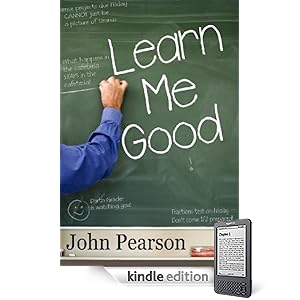
This book takes the form of a series of emails from Jack Woodson to a former colleague, Fred. Jack was made redundant after nearly 4 years at a thermal design firm, and decided to retrain as a teacher. The emails cover his first year as an educator, teaching 3rd grade and while names have been changed to protect the innocent the emails are based on real experiences.
The format of the book meant it was a nice easy read, with the emails creating an equivalent to short chapters. It would have been a nice book to have dipped into when I only had a bit of spare time to read, but in reality I read this over the course of two afternoons.
Due to the nature of the book, while we learn a bit about the background and physical attributes of Jack and some of his class and colleagues, this isn't really a character driven book, it's more of a literary sit-com. There are plenty of anecdotes about what his charges have said or done, and his responses to them. Some of the stories are so shocking you have to laugh and others must have bemused Jack as they certainly puzzled me. It is certainly a funny book and I found myself chuckling quite a lot. However I am also now in a state of fear. What starts in the States often makes it's way to this side of the pond, so I guess by the time my little one starts school I'll have to buy gifts for teacher for all sorts of occasions with no relation to education.
Quips aside it was also interesting to find out incidentally about some of the issues facing urban schools. I suspect a lot of the issues are the same here as in the US, such as teaching kids for whom English isn't a first language and endless testing. Don't expect serious debate though, this is a light hearted, irreverent book that suited my need for a short, humourous read perfectly.
Sunday, 16 January 2011
Book Review: State of Rebellion - A Pug Connor Novel by Gordon Ryan
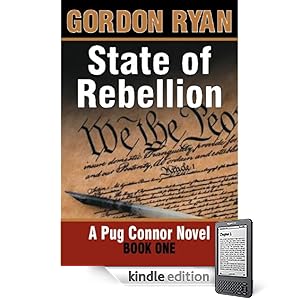
This book was provided by the author to a number of users on the Amazon forums in return for honest reviews. When I read the synopsis it struck me as the type of book I would enjoy so onto my kindle it went.
The basic premise of the book is that there are shadowy forces at work in the state of California who, for their own means, want the the state to secede and become a republic. They are in the background manipulating events to their own ends. The idea of secession has struck a note with various militia organisations and indeed a section of the public who has had enough with what is seen as ever-increasing federal interference. A series of crimes take place, all carefully planned to advance the cause.
The character of the title isn't the main character in this book, but he does play a key role and the book has set up his background and credentials for the next in the series. Instead the main protagonist is Dan Rawlings, an administrator and novelist who finds himself struggling to choose between his loyalties to the USA and to California. I thought the main characters were well drawn and I empathised with Dan for what we are told he has been through and what he goes through in the book. I don't know if he will make an appearance in further books but I hope so.
I would describe this more as a political intrigue than a thriller or action novel. I found the idea that this could potentially happen intriguing and despite feeling there was something of a lull in the middle of the book was hooked by all the twists and turns the events took.
I have a couple of criticisms though. Firstly there are a lot of acronyms used, especially in relation to military terms. I expect to an American reader they would probably be obvious but no so to me. Using the term they stand for in full before turning to the acronym would have been helpful. Secondly I was slightly perplexed by a scene which takes place in London, where a car hits a corner water hydrant which then spouts a geyser. We've all seen it on tv and in movies but I can't remember having ever seen a corner water hydrant in London, or elsewhere in the UK. They may exist but to me it stuck out as being incongruous and it distracted me a bit while I puzzled over it.
Overall I found this an interesting book with a storyline that was all the more fascinating for it's plausibility. I will certainly be reading the second book in due course.
Friday, 14 January 2011
Book Blogger Hop 14th Jan- 17th Jan
I love the Blog Hop hosted by crazy-for-books.com, and especially the weekly questions (and of course having a nose at other people's answers) This week's question is:
"Why do you read the genre that you do? What draws you to it?"
I read a lot of different genres, although fantasy doesn't really float my boat. I really like a good thriller that draws me in and makes me want to keep reading to find out what happens. When I get engrossed in a book like that it's pure escapism. I also enjoy historical books, particularly modern history and stories from other countries. I don't mind whether it's a true story or fiction based on real events. I love to feel like I'm learning about events and about places I may never get to visit.
Labels:
Book blogger hop,
genres
Wednesday, 12 January 2011
Book Review: The Reluctant Traveller by Bill Lumley
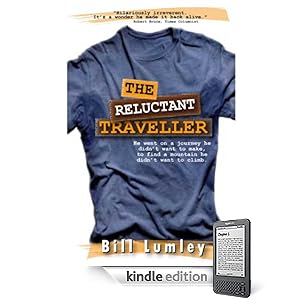 Author Bill is afraid of all sorts of things, and it seems usually has ready-prepared excuses to keep himself out of harm's way. So a climbing trip to find a lost mountain in Ethiopia was never going to be his perfect holiday. Shame he managed to agree to the trip while under the influence and amazing he didn't manage to wheedle his way out of it.
Author Bill is afraid of all sorts of things, and it seems usually has ready-prepared excuses to keep himself out of harm's way. So a climbing trip to find a lost mountain in Ethiopia was never going to be his perfect holiday. Shame he managed to agree to the trip while under the influence and amazing he didn't manage to wheedle his way out of it.I found this account of his travels in Ethiopia and the hazards he encounters along the way laugh out loud funny, there are some great one liners, but also very interesting. His descriptions of the places may not win him any friends at the tourist board but have painted a picture for me (who definitely doesn't have Ethiopia on her list of places to see) and I now feel like I have a better feel for the geography and climate of the place, as well as what might face the intrepid travellers who do go there. I also picked up a few facts which might come in handy for the pub quiz.
This was a funny, easy read and well worth every penny.
Sunday, 9 January 2011
Book Review: No Good Deed by Mary McDonald
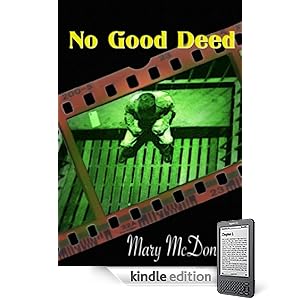
No Good Deed is a book that I had noticed getting a lot of praise from kindlers online, the synopsis caught my eye and being in the mood for a thriller it was the next book summoned from The Stack - my list of books to be read.
Mark Taylor is a Chicago-based photography with a good business but one piece of kit that doesn't provide him with the images he wants. The old camera purchased in Afghanistan produces images of death and accidents. Mark then has dreams that give more details about these deaths, and if he can intervene in time he is able to save the people pictured. Unfortunately for Mark he is able to predict 9/11 but despite his best efforts to alert authorities he is passed off as a crank. Worse yet the CIA and FBI then decide he must have been involved to have known as much as he did prior to the attacks, arrest him, declare him an enemy combatant and detain him without charge or trial. The product description on Amazon, which I only actually read after completing the book, reveals too much of the plot for my liking so I won't post any more on the storyline than that.
I really enjoyed this book and if it wasn't for extreme tiredness brought on by weeks of sleepless nights with my little one I would without a doubt have finished it in one evening. Mark is a likeable character who, as we see at the very beginning, is trying his best to help save people. As per the title no good deed goes unpunished and although he is an innocent man he is subjected to highly questionable methods of torture. I found these scenes quite harrowing but not gratuitous.
The book started at a fast pace, settled in the middle (although I never felt it was dragging as I was so keen to find out whether Mark would survive his captivity) and then rapidly picked up pace again towards the end. Unusually for a thriller it really made me think. It certainly provides a graphic demonstration of why the erosion of civil liberties as a result of rushed laws on terrorism in the aftermath of 9/11 should be such a cause for concern. I appreciated that both sides of the argument were presented, as the CIA agents try to defend the methods they use in dealing with Mark. It also made me wonder whether in Mark's position I would want to take on responsibility and try and save lives or whether I would try and get rid of the camera.
I am full of praise for this book and was delighted to see at the end that the sequel is due out this month!
Saturday, 8 January 2011
Book Review: Jimmy Stone's Ghost Town by Scott Neumyer
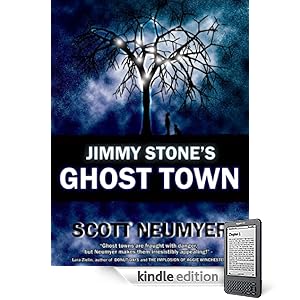 I don't read a lot of YA fiction but since I got my kindle I have been trying to read a wider range of books. The author has been promoting the book on Amazon's kindle forums so I thought I would give it a try.
I don't read a lot of YA fiction but since I got my kindle I have been trying to read a wider range of books. The author has been promoting the book on Amazon's kindle forums so I thought I would give it a try. Jimmy Stone has been having a hard time of it, first his parents come home from the hospital without his soon to be baby sister, then his mum dies and his dad decides they should move and turns into a beer swilling couch potato. Jimmy has no friends, other than faithful dog Trex, until David befriends him to help him avoid the school bullies. The 3 of them, exploring woods behind Jimmy's house, end up in mysterious ghost town and discover that to return home they have to complete a series of tasks.
This is obviously setting up a series, it is revealed Ghost Town is one of seven other realms outside our world. The first third of the book is primarily setting up Jimmy's back story and introducing him as the main protagonist. The next part introduces Ghost Town and the boys find out a bit about what is in store for them, and in the final third they carry out their first task.
I'm quite a bit older than the target audience and my daughter is only a toddler so I haven't got anyone of that sort of age to help me judge the book from the ideal viewpoint. For me Jimmy's hardships were covered for too long and repeated more than necessary, but I suspect for a younger reader it is setting up the idea that you can overcome any difficulties to become as strong person. There is still an element of mystery about what became of his soon to be sister and mum though, which I'm hoping will be revealed in future books. We do see Jimmy developing in the book, which I liked, especially becoming more assertive. David is more mysterious, I think he is meant to seem that way to Jimmy but I hope that in the next book the reader will find out more about his background. I would also like to know why Jimmy is the chosen one, although if this is indeed a series of 7 it's early days yet.
I thought the book was well written, it raised a few smiles and I imagine would have kids of the right age laughing. It must say something about the way it is written that despite it not being one of my usual genres I want to read the next one to find out more.
Friday, 7 January 2011
Blog Hop time!
Thank crunchy it's Friday, and that means it's Book Blogger Hop time - the first one of 2011. The Hop is hosted by Crazy-For-Books.com, runs from Friday to Monday and is a fun way to find other book bloggers. This week's question is:
What book influenced/changed your life? How did it influence/change your life?
I had to really think about this, and decided it would have to be JG Ballard's Empire of the Sun. I read it when I was quite young and have revisited it many times since. It made me realise how much more there was to the dry history I was being taught at school, and the impact of war on individuals. Fabulous book.
What book influenced/changed your life? How did it influence/change your life?
I had to really think about this, and decided it would have to be JG Ballard's Empire of the Sun. I read it when I was quite young and have revisited it many times since. It made me realise how much more there was to the dry history I was being taught at school, and the impact of war on individuals. Fabulous book.
Book Review: The Up-Country Man by Kenneth Ryeland
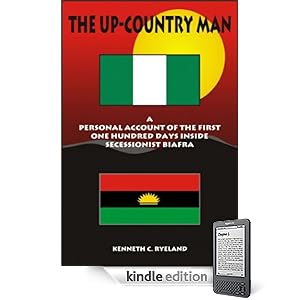
My interest in the war in Nigeria in the 1960s was piqued some time ago when I read Half of a Yellow Sun, by Chimamanda Ngozi Adiche, a fictional account of various characters' experiences of the foundation of Biafra. Being a child of the 70s it was something I knew virtually nothing about. Therefore when I came across this book I thought it would be really interesting to read a first-hand account. The author Kenneth Ryeland moved to Nigeria as a young man in 1967, working as an engineer. His company had played down reports of previous unrest and Ryeland planned to move his young family to the country to join him after the completion of his probation period.
The book intially details the culture shock experienced by the author and another young colleague upon their arrival, having to adjust to a new geography and culture. Ryeland is moved to a posting in Enugu amid rumours that secession will occur, and when it does he finds himself living in the new state of Biafra. The "police action" seriously disrupts life for the Europeans as well as for the rest of it's new citizens.
I found the book fascinating. I really liked the use of Pidgin English in the book as I felt it illustrated one of the most obvious difficulties the author must have faced on arriving in Nigeria and lent real flavour to the book. The story of Adam and Eve in Pidgin at the start really helped my understanding, so while I couldn't translate it I certainly got the gist. The story was so descriptive of the places and people, but without being unnecessarily wordy.
I can imagine some people might be uncomfortable with some of the portrayals of the white man as master and the locals as servants but it is illustrating how things really were at the time, is basically a historical account of events and it would be wrong to sanitise the book to appease people.
This book contained enough description of Nigeria and it's people to satisfy me as a travel book, enough about factual historical events to make me feel like I was learning something by reading it, and enough emotion and anecdotes for it to be a thoroughly enjoyable read.
To censor or not to censor?
Last night on the way home from work I was sat on the train talking to a couple of ladies who commute from the same place at the same time as me. We often have a good old gossip and set the world to rights as a way of passing the time. I'd been reading my kindle on the platform when they arrived so inevitably the conversation started with reading and went from there. One of the ladies then mentioned that she'd heard the publishers of The Adventures of Huckleberry Finn were now going to publish it changing the "n" word to slave and changing the word "injun" with something deemed to be less offensive.
I'm not particularly comfortable with this sort of censorship and dislike the idea that by changing a few words we sanitize the past, or worse still pretend it never happened. I haven't read any Mark Twain (is this a heinous ommission on my part?) so I can't comment on the use of the offending words in the particular books causing the row, but is it really so unreasonable to use certain words where they suit the context? I would certainly never use the "n" word but historically it was widely used.
The book I am reading at the (review coming soon) is an account of life in Nigeria in the 1960s, and parts detailing the relationship between the Europeans and the Nigerians may make for uncomfortable reading but it is a factual piece and pretending things were different would be re-writing history.
The consensus on the train (after a couple of others who overhead what we were chatting about joined in) was that you should look at when the book was written, accept that it is of it's time and maybe put a page in at the front to indicate some of the language is no longer considered acceptable but that it has been left as was to maintain authenticity. The general feeling was that in an attempt to make sure nobody could ever be offended by anything we are losing something, and becoming overly concerned with words, when what actually really matters is the feeling being expressed. Personally I have friends of all faiths, and I don't know any of them who are offended by being wished a Happy Christmas, and I've definitely never come across anyone who has a problem with Hot Cross buns.
So, are we becoming too sensitive and should we rein it in, or am I ,and the people I was chatting to, racist and anti-other religions?
I'm not particularly comfortable with this sort of censorship and dislike the idea that by changing a few words we sanitize the past, or worse still pretend it never happened. I haven't read any Mark Twain (is this a heinous ommission on my part?) so I can't comment on the use of the offending words in the particular books causing the row, but is it really so unreasonable to use certain words where they suit the context? I would certainly never use the "n" word but historically it was widely used.
The book I am reading at the (review coming soon) is an account of life in Nigeria in the 1960s, and parts detailing the relationship between the Europeans and the Nigerians may make for uncomfortable reading but it is a factual piece and pretending things were different would be re-writing history.
The consensus on the train (after a couple of others who overhead what we were chatting about joined in) was that you should look at when the book was written, accept that it is of it's time and maybe put a page in at the front to indicate some of the language is no longer considered acceptable but that it has been left as was to maintain authenticity. The general feeling was that in an attempt to make sure nobody could ever be offended by anything we are losing something, and becoming overly concerned with words, when what actually really matters is the feeling being expressed. Personally I have friends of all faiths, and I don't know any of them who are offended by being wished a Happy Christmas, and I've definitely never come across anyone who has a problem with Hot Cross buns.
So, are we becoming too sensitive and should we rein it in, or am I ,and the people I was chatting to, racist and anti-other religions?
Labels:
censorship,
Mark Twain
Sunday, 2 January 2011
Book Review: The Losing Role by Steve Anderson
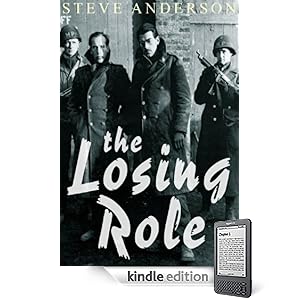
It's winter 1944 and Max Kaspar is pulled from the Eastern Front for a role in a secret mission. Before the war Max was an actor and having lived and worked in New York, and as an English speaker, he is considered ideal for the task at hand. The role - masquerading as an enemy US officer, his aim - to use the opportunity to escape the war and return to the States. Having been trained and put into a team Max finds himself caught up in the Battle of the Bulge, and his plan goes far from smoothly.
This book is based on the true story of German false flag operations but the characters are largely fictional. I'm not very knowledgeable about WWII and what happened where and when but from the authors note at the end of the book and what I do know it seems very rooted in fact.
I thought this book was amazing, the author's descriptions are so evocative I could almost feel the chill in the air and really imagine the discomfort the soldiers were enduring. I haven't read many war books, but particularly few written from a German perspective. In the end it didn't really matter as one of the things that comes strongly across is that it doesn't matter which side you are fighting for, the soldiers are people and the casualties are all human.
I'd hate to include any spoilers so had best not say too much more, other than that I will now be hunting down other work by the author, it was a fantastic, well written read. I'll definitely be recommending it to family and friends.
Saturday, 1 January 2011
Book review: Crescent Dawn by Clive Cussler
I have read a lot of Cussler's books in the past and after a few I hadn't particularly enjoyed I had decided to steer clear for a while. I clearly didn't mention it to my husband though, as a hardback copy of Crescent Dawn was waiting for me under the tree on Christmas morning. Fortunately this book seems to be a return to form for Cussler and I found myself enjoying it, although there were still a couple of negatives for me.
The book starts in 327AD with a pirate attack on a Roman bireme. It then moves on to 1916 and the sinking of HMS Hampshire with Lord Kitchener aboard. Moving to 2012 we find Dirk Pitt and the NUMA team dotted around in the UK, Turkey and Israel, attempting to discover the fate of those ships while becoming caught up in a series of linked atacks in the middle East. What is the connection between the ships and the series of artefact thefts and explosions? Cussler deftly weaves the various strands of the stories together in a way that left me cursing that I couldn't sneak in a bit more reading time.
As a plot terrorists trying to destablise the middle-East and the plundering of ancient artefacts aren't really anything new, I've read a couple of books with similar plots in the last few years. However Cussler writes it well and his unique point of view comes from the marine archeology side of things. I also find the parts written from the historial viewpoint very interesting and I always feel like the author has done his research due to the level of detail.
One of the things I had found off-putting about other books was Dirk Pitt Snr's sexist demeanour and some of the daft catchphrases the characters seemed to be regurgitating over and over, so I was pleased that neither were present in this book. I also enjoyed seeing the characters of Dirk Junior and Summer being developed. However I do still feel that Cussler's female characters are less well written and have less depth than their male counterparts.
Overall I felt this was much more like Cussler at his best and will forgive him some of the recent books I didn't enjoy.
The book starts in 327AD with a pirate attack on a Roman bireme. It then moves on to 1916 and the sinking of HMS Hampshire with Lord Kitchener aboard. Moving to 2012 we find Dirk Pitt and the NUMA team dotted around in the UK, Turkey and Israel, attempting to discover the fate of those ships while becoming caught up in a series of linked atacks in the middle East. What is the connection between the ships and the series of artefact thefts and explosions? Cussler deftly weaves the various strands of the stories together in a way that left me cursing that I couldn't sneak in a bit more reading time.
As a plot terrorists trying to destablise the middle-East and the plundering of ancient artefacts aren't really anything new, I've read a couple of books with similar plots in the last few years. However Cussler writes it well and his unique point of view comes from the marine archeology side of things. I also find the parts written from the historial viewpoint very interesting and I always feel like the author has done his research due to the level of detail.
One of the things I had found off-putting about other books was Dirk Pitt Snr's sexist demeanour and some of the daft catchphrases the characters seemed to be regurgitating over and over, so I was pleased that neither were present in this book. I also enjoyed seeing the characters of Dirk Junior and Summer being developed. However I do still feel that Cussler's female characters are less well written and have less depth than their male counterparts.
Overall I felt this was much more like Cussler at his best and will forgive him some of the recent books I didn't enjoy.
Subscribe to:
Comments (Atom)


